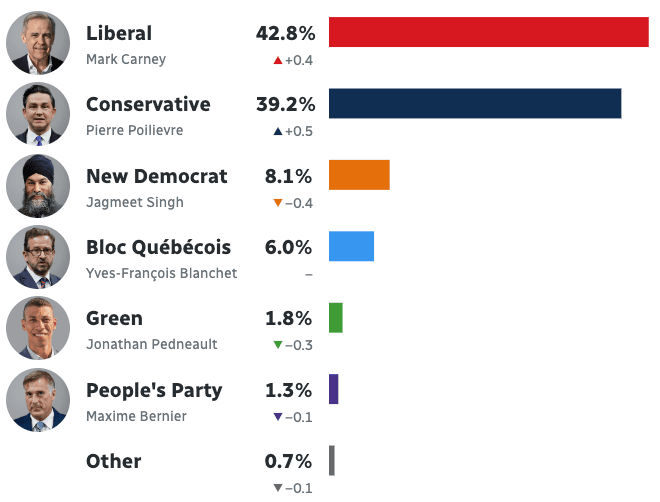
Image courtesy of CBC.
Tightening polls could inject some volatility into CAD exchange rates.
The Canadian Dollar is not showing concerns about the outcome of the election, but there are risks says a leading analyst.
Karl Schamotta, Chief Market Strategist at Corpay, says a tightening in polls means the risk of some form of coalition arrangement can no longer be discounted by markets, which offers potential complications for a country synonymous with a steady and solid political environment.
The call comes as polls tighten considerably from showing a decisive Liberal victory under Prime Minister Mark Carney. CBC's Poll of Polls shows the Liberals' lead is down to 3.6 points.
"Foreign exchange markets look remarkably unworried," says Karl Schamotta, Chief Market Strategist at Corpay, of the vote.
He notes that risk reversals – an options product which measures the cost of insuring against a big downside move in the currency – are trading well below post-pandemic averages after declining sharply in the last month.
"This seems well-justified, given the relatively centrist policy stances recently adopted by both major parties," says Schamotta.
But Corpay joins other analysts in warning that there is a risk of a minority government, which FX markets might underestimate.
"This might force the victor to seek an alliance with the nominally separatist Bloc Québécois and generally complicate the business of government," says Schamotta.
"A negative reaction could be seen in the Canadian dollar if neither party succeeds in securing a majority," he adds.
Bloc Québécois is a federal political party in Canada that primarily advocates for the interests of Québec at the national level, with a strong focus on promoting Québec nationalism and sometimes Québec sovereignty
It holds an economic stance centred on Québec nationalism, emphasising provincial autonomy and the protection of Québec's distinct economic interests.
"The election outcome is unlikely to move the CAD materially, assuming a majority win for either party. The biggest risk is perhaps that the result delivers a narrow minority government which may lead to the perception that Canada’s negotiating leverage with the U.S. over trade somewhat compromised," says Shaun Osborne, Chief FX Strategist at Scotiabank.
Federal election results will start trickling in from about midnight BST for the Atlantic provinces when the polls close. Quebec and Ontario should start releasing results from 2AM, with the two provinces account for about 200 seats, allowing for a decent indiactor of where we are headed.
